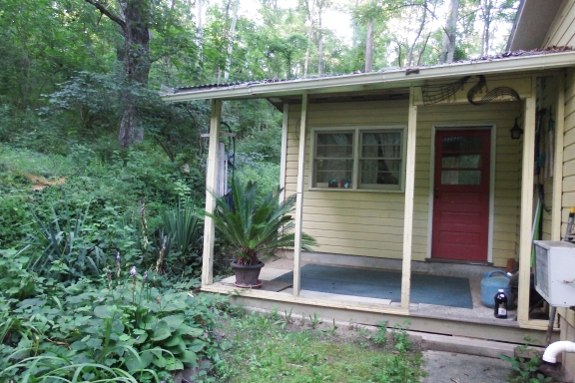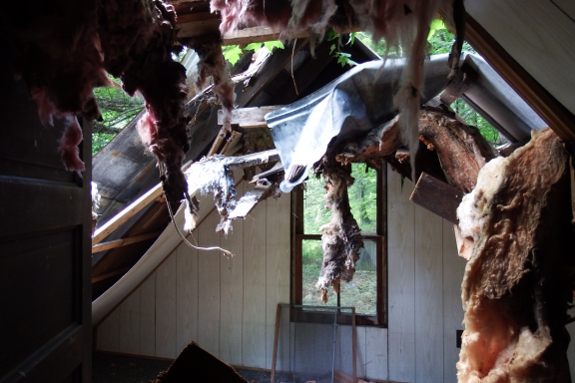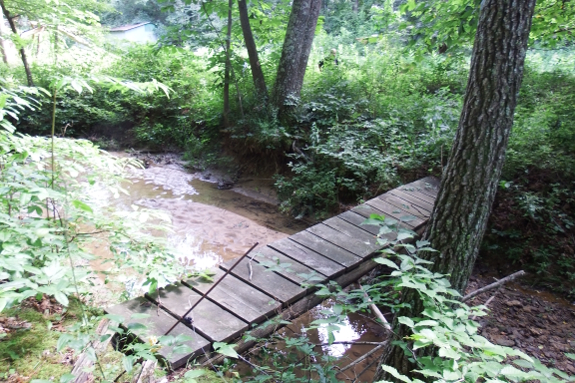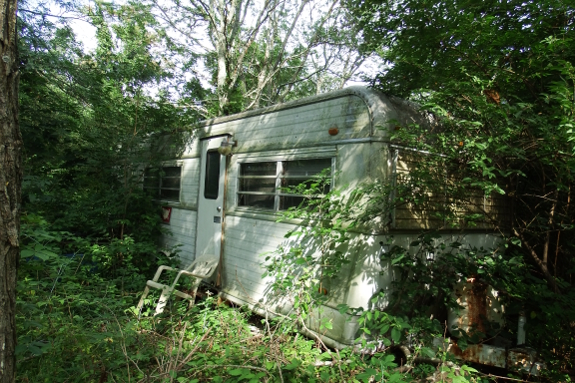
Using a mortgage to buy a homestead

Last time I bought land,
I was just out of college and dirt poor. I saved every penny, hoping to
achieve $10,000 within the next decade and buy a 10-acre farm with
cash. But when I was $2,000 in, a very kind friend jumped into the
breach and offered me an interest-free loan on a larger amount. I
bought the largest ugly-duckling property I could comfortably afford,
paid the friend back several years later when that property allowed us
to live off our microbusiness,
and was endlessly grateful for the jumpstart.
This time around, Mark
and I are being more conventional. We've calculated the likely selling
price for this place based on recent sales in the region, and we're
looking for properties in that same range. Rather than selling before
buying, though, and being entirely debt-free, we decided to get
pre-approved for a mortgage so we could spend a little more money up
front but do things in the easy order --- move before we put this place
up for sale.

In the process, I've
learned a lot about land buying that I thought the conventional among
you (probably everyone except younger me!) might benefit from. First of
all, by using a site like Lending Tree to compare rates, you're asking
to join masses of email and phone lists --- beware! None of those
potential lenders will answer a simple question --- they all want every
ounce of your personal and financial data so they can take you all the
way to preapproval. Meanwhile, if you're self-employed, the data those
intaker officers need dives all the way down to your tax returns from
the previous three years. Wow, that's a lot of information to share
with looky-loos.
And yet, after extensive
research, I learned that rates aren't even set at the preapproval stage
and that most lenders will give you approximately the same rate as all
the others, with that amount depending on your financial portfolio and
credit history. So you might as well instead select a lender based on
reviews and other factors, such as those I discuss below.

The next hurdle to
bridge is the difference between buying a house and buying an acreage.
10 acres seems to be the dividing line between the two, but it also
matters whether the dwelling passes muster (many owner-built homes and
old farm houses won't) and whether your home-to-be is on wheels (a
higher interest rate) or on a permanent foundation. Keep in mind, also,
that if you buy a home instead of land, you'll need to pay home owner's
insurance as a mandatory part of your mortgage agreement.
The trick if you want to
buy a farm rather than a house with a few acres appears to be going
with a local bank rather than with a big company. By contacting a bank
in the community we plan to move to, we were given the option of
choosing a non-federally-approved loan that will cover unimproved land
or a federally-approved loan that won't. The former has a lower
interest rate...but one that will change over time (a problem for us
only if we don't manage to sell this property within the first fixed
term of three to five years). Improvement level also makes a difference
on properties that lack domiciles, so pay attention to the presence or
absence of developed water, electric, and septic on potential
properties. Finally, the percent you're expected to pay yourself will
vary depending on which type of property and type of loan you choose to
pursue.

Phew! Learning what I
just put into this post took about a week and a half of phone calls,
web searching, and emails to ferret out. On the plus side...youthful
me's anti-debt ways means our credit is excellent so we just got
preapproved. Now we're ready to really get serious about this move.
Want more in-depth information? Browse through our books.
Or explore more posts by date or by subject.
About us: Anna Hess and Mark Hamilton spent over a decade living self-sufficiently in the mountains of Virginia before moving north to start over from scratch in the foothills of Ohio. They've experimented with permaculture, no-till gardening, trailersteading, home-based microbusinesses and much more, writing about their adventures in both blogs and books.
Want to be notified when new comments are posted on this page? Click on the RSS button after you add a comment to subscribe to the comment feed, or simply check the box beside "email replies to me" while writing your comment.

Wow So much useful information.!!!
Hi Anna and Mark,
I got into the habit of making the money first. Then I just have to be careful with what I do with MY money. No parasites sucking my blood.
Good luck to you both, John
For most people the reality is that you need a mortgage to buy property.
But I've been taught (and agree) that debts are not a good thing and should be paid off as soon as practical.
So I would advise you to get a mortgage that allows you make extra payments without penalty if opportunity presents itself.
I trust you won't be buying a McMansion. Yet you should think carefully about how much land you can and will actually use. While it might be nice to have a large buffer around your homestead, you will be paving for it.
Yet you should think carefully about how much land you can and will actually use. While it might be nice to have a large buffer around your homestead, you will be paving for it.
On the other hand, one reason to buy more land than you need right now (if you can afford it) would be as an investment. Maybe to sell it later. Or for a long-term low maintenance crop. An acquaintance who now farms in New Zealand used part of his farm to plant a forest for timber that will be mature and be harvested when he retires.
Maybe a mortgage is a good way. Maybe something else will come up. Maybe what you need today is a deadline. For example you could say if we haven't raised the money for what will make us happy by December 18 we are going to get a mortgage.
Transition times can be pretty nerve wracking. May you make it sanely to the other side.
I can share buying experience from years back- in 1997, I and my then wife were looking for a place semi country, and found what was five acres 40 minutes from my work that had a well remodeled mobile home on it- from the road, one could not tell it was a mobile home, it had a roof over, an addition with a nice potbelly wood stove, and had been sided in cedar.
The asking price was $42,000. I very soon discovered that the mobile home was not considered an asset to the property, and that we would basically be buying raw land. I had to come up with about 25% down to even get a bank to speak to me! At the time, this was not going to happen. Manufactured homes depreciate like a car, stick built homes do not.
A month later, we were able to buy a conventional home on a lot for 68,000 with 2% down on an FHA loan.
I wondered how all these low income folks had mobile homes in the country, I discovered the manufactured home industry basically finances itself at higher rates than buying a conventional home.
You find the land, they buy it, put in the well and septic, set up the house and you sign you life away for a much higher interest rate than a conventional mortgage would be.